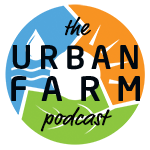405: Rhonda Sherman on Worm Farming.
Organically recycling through vermicomposting.
 Rhonda is an extension specialist in the Department of Horticultural Science at North Carolina State University, providing leadership for university outreach programs on solid waste management issues through the Cooperative Extension Service. She holds degrees in Environmental Studies and Urban/Regional Planning, and Environmental Resources Analysis with an emphasis in solid waste management.
Rhonda is an extension specialist in the Department of Horticultural Science at North Carolina State University, providing leadership for university outreach programs on solid waste management issues through the Cooperative Extension Service. She holds degrees in Environmental Studies and Urban/Regional Planning, and Environmental Resources Analysis with an emphasis in solid waste management.
Rhonda’s areas of expertise are vermicomposting, composting, recycling, and waste reduction. She gives about 40 presentations annually and has authored over 65 publications on these topics. Her new book is The Worm Farmer’s Handbook: Mid- to Large-Scale Vermicomposting for Farms, Businesses, Municipalities, Schools, and Institutions published by our friends at Chelsea Green.Don’t miss an episode! Click here to sign up for podcast updates
In This Podcast:
As an extension specialist in the Department of Horticultural Science at NC State University, Rhonda Sherman shares how throwing away our food waste is a major problem in landfills, releasing methane gas which is a contributor to climate change and causing heavy metals to be released into water sources. She spends 90 percent of her work time educating people in what to do with their food waste instead, namely by composting or vermicomposting. Rhonda shares access to many of the publications she’s written which can be found on her website.
Listen in and learn about:
-
- Why she began teaching about worm farming
- The problems of dumping our food waste into landfills
- What you should do if you want to get started with worm farming
- What her demonstration worm farm entails
- How you can access free vermicomposting curriculum for schools
- The environment is not part of our education system.
- Why researching vermicomposting before beginning is important
- Why googling sites that end in .edu or .gov when researching vermicomposting is vital
As well as:
- Her failure – She had a couple worm bins outdoors in carport one winter in North Carolina, but didn’t insulate one of the bins enough and the worms died.
- Her success – People in 110 countries have contacted her personally for unbiased information to find out about worm composting
- Her drive – Her desire to help people and also to help the planet.
- Her advice – Thoroughly research about vermicomposting before jumping into it. Check out websites that end in .edu or .gov
Books written by Rhonda:
She also co-edited and wrote a few chapters in:
Vermiculture Technology: Earthworms, Organic Wastes, and Environmental Management
The population bomb by Paul R. Ehrlich and Anne Ehrlich
Website: composting.ces.ncsu.edu
Email: sherman@ncsu.edu
UrbanFarm.org/wormfarmershandbook
Note: You can also find these books mentioned above at one of our favorite local independent bookstores and have the satisfaction of knowing you are supporting a small business.

*Disclosure:
Some of the links in our podcast show notes and blog posts are affiliate links and if you go through them to make a purchase, we will earn a nominal commission at no cost to you. We offer links to items recommended by our podcast guests and guest writers as a service to our audience and these items are not selected because of the commission we receive from your purchases. We know the decision is yours, and whether you decide to buy something is completely up to you.






Wow, husbandry for worms, to do this in L.A. It was 102 recently, read guide, but will the heat kill ?
There are steps you can take to keep your worm bin comfortable for your worms. I discuss them in my book.